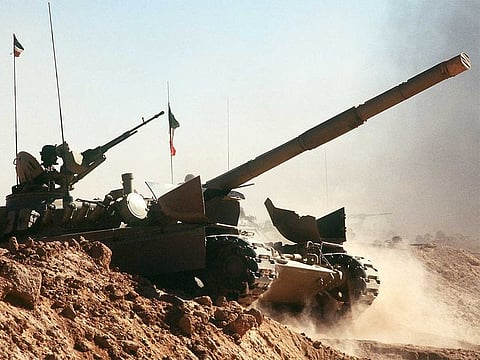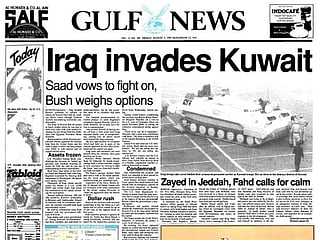Today’s regional challenges can be traced to Iraq’s invasion of Kuwait
Rise in Iran’s influence, waning importance of Palestinian issue among Gulf War fall outs

Thirty years ago Iraqi forces stormed into neighbouring Kuwait; a seismic geopolitical event whose reverberations can still be felt across the region today. Historians and political analysts continue to dig into the reasons and motives that drove Saddam Hussein, whose country was still reeling from an 8-year war of attrition with Iran, to commit such a strategic blunder.
Was he lured into invading and later annexing Kuwait following a spat over oilfields’ rights by a superpower? Or was it one of those rash and ill-conceived decisions that Saddam lived to regret and later pay dearly for it?
Regardless, the August 2, 1990 invasion of Kuwait, resulting in horrific plundering of that country, set in motion a series of events that continue to overshadow the region. Saddam had plenty of opportunities to pull back and reach a political settlement but his enlarged ego and pride were his most dangerous enemies.
History would have taken a different course had he resolved his conflict with Kuwait peacefully and the region might be in a better place for itOsama Al Sharif, senior Arab analyst
Seven months later his army was crushed and whatever was left of it was chased back into Iraqi territory. The US-led international coalition stopped short of invading Iraq — that disastrous event would take place a decade later by George H.W. Bush’s son.
In retrospect, the invasion of Kuwait and the ensuing first Gulf War can only be seen as a key milestone in the geopolitical evolution of the region. Both events, which can only be seen as one, coincided with the collapse of the Soviet Union, the end of the Cold War and the emergence of a new world order.
A new alliance
Saddam had failed to understand the crucial lessons of that phenomenal moment in history — and lived to regret it. President Bush was quick to redefine America’s role in the Middle East. The fact that his broad international coalition included key Arab countries, including Egypt and Syria, signalled a broad change in regional and international alliances.
The humiliating defeat of the Iraqi army in Operation Desert Storm signalled the beginning of the marginalisation of Iraq both as a military and political regional power.
It also marked the deepening of America’s involvement in the region, especially in the Arabian Gulf, including a permanent military and naval presence. The defeat of Iraq, which was followed by the imposition of harsh economic sanctions on that country, was a game changer for the Arab-Israeli struggle.
President Bush followed his military victory by launching the Madrid peace conference in October 1991 aimed at resolving the decades-old conflict. The conference failed but it triggered secret negotiations between Israel and the PLO that later delivered the Oslo Accords.
In hindsight, one wonders if was it not for Iraq’s invasion of Kuwait and the outcome of the Gulf War, would Palestinian leader Yasser Arafat, a staunch ally of Saddam, dare engage in secret talks with Israel.
Iraq’s invasion of Kuwait dealt a heavy blow to an already frail Arab Order. One would say that the Arab Order, the notion of intra-Arab cooperation as manifested in the Arab League body, has never recovered.
The Gulf War had polarised the region even further and brought down nascent attempts to create intra-regional alliances such as the Arab Maghreb Union and the Arab Cooperation Council.
A world of challenges
Iraq posed a challenge to post-Bush Sr. US administrations. The biting UN economic sanctions on Iraq were condemned by many countries and human rights organisations. It is believed that the direct effects of the sanctions and trade embargo had killed thousands of Iraqis, especially children.
Saddam’s Baathist regime remained intact even as its grip over the north and the south had loosened as a result of the no-fly zone.
Following the 9/11 terrorist attacks on the US in 2001, President George W. Bush began eyeing Iraq as part of America’s regional expansion under a neo-conservative mantra. In 2003 he and British Prime Minister Tony Blair took the catastrophic decision, against feeble evidence that Iraq was in possession of WMD’s, to invade Iraq and topple the Saddam regime.
The rest is history. Iraq was devastated and the US occupation gave rise to pro-Iran Shiite extremists whose sectarian agenda was met by the birth of Sunni militant groups, including Daesh.
It is ironic that Saddam and the junior Bush have something in common; both had miscalculated and took a rash decision to invade only to see their goals undermined. Today Iraq is torn between its strategic dependence on the United States and the deep interference by Iran and its militias in its political affairs.
With Iran now seen as a major regional threat to its Arab neighbours, Iraq can do little to distance itself from a possible US-Iran showdown.
The US invasion of Iraq had turned that country into a failed state, while empowering Iran whose tentacles now extend to Syria, Lebanon and Yemen. Today, the region presents an entirely different geopolitical stage than that of the 1990s.
But the root causes for most of today’s regional conflicts and intractable challenges can be traced in one way or another to Saddam’s notorious and ill-fated decision to invade Kuwait. History would have taken a different course had he resolved his conflict with Kuwait peacefully and the region might be in a better place for it.
— Osama Al Sharif is a journalist and political commentator based in Amman.
Sign up for the Daily Briefing
Get the latest news and updates straight to your inbox








